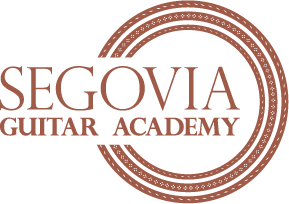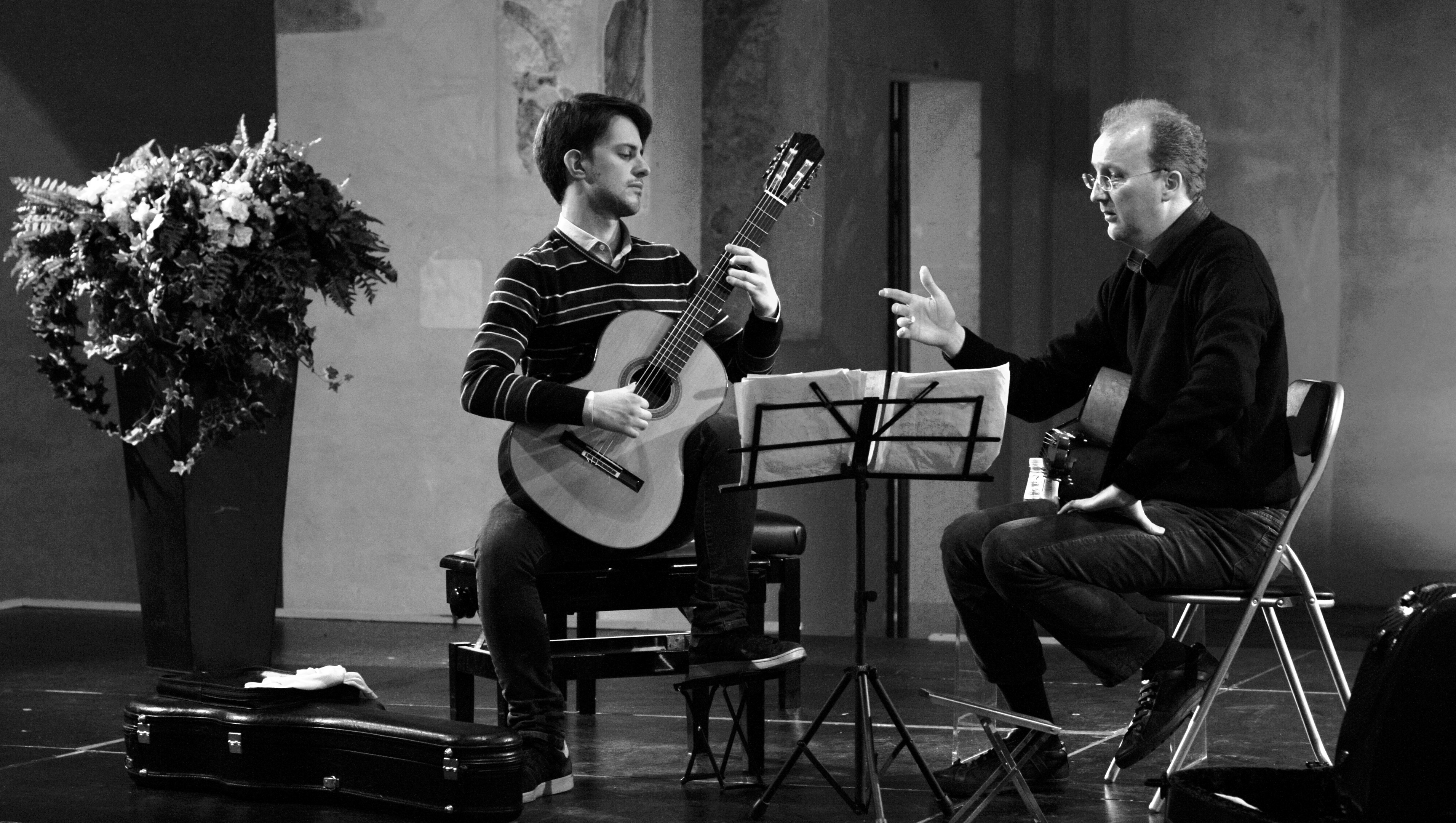The guitar perfection courses held at Pordenone have represented for thirty years a spotlight for guitarists on an international scale. This is demonstrated by countless prestigious achievements and acknowledgements obtained by the school’s students throughout the years.
Our didactic principle is founded upon the search for maximal spontaneity within every musical and expressive event. Therefore, to us technique consists in the ability of knowing how to use the body in its most natural way, free to perform the appropriate gestures that help the musician fulfill the ideas found in the music score.
To interpret means to feel, to desire, to understand and to realize. A large part of the interpreter’s research is consequently carried out analyzing all the objective and subjective elements that blend into the creation of sound, therefore making compositions live, translating sensations and emotions suggested by the notes, liberating music as it is and as it is heard.
Courses:
Individual and chamber music courses are held by Maestro Paolo Pegoraro.
- Annual master
8, 12 or 16 lessons programmed freely in agreement between teacher and students. - Biennial perfecting master with final diploma
16 lessons per year, complying with the biennial study programme. - Chamber music perfection course
8, 12 or 16 lessons programmed freely in agreement between teacher and students.
A different number of lessons can also be defined under special request to the administration.
The lessons could be in Italian, English and Spanish.
The courses periods will take place starting October 2025 up until June 2026, at the Segovia Guitar Academy, located at Vicolo delle Acque, 2/a, Pordenone. For those who plan to attend, it will be necessary to pass an admission examination sending a video containing the program for the course you wish to attend (YouTube, Vimeo, WeTransfer, etc.) within Saturday 13th of September 2025 at the following email addresses:
These are the dates of the meetings for the current school year 2024-2025:
16, 12 and 8 lessons courses
• 2025: 18-19 October, 15-16 November, 13-14 December.
• 2026: 7-8 February, 21-22 March, 18-19 April, 16-17 May, 13-14 June.
It is also possible to attend lessons online.
Video exam programme:
• annual master: free choice programme of approximately fifteen (15) minutes;
• biennal perfecting master with final diploma: predetermined admission exam programme.
Participation certificates and merit diplomas will be conferred after completing the lessons.
Download:
Biennial Master with final exam
In order to access the triennial course for the Perfection Diploma, musicians who already possess a regular diploma or a 1st level masters degree obtained in Italy or in a foreign country must qualify a further admission exam.
Acces to final exams will be determined by the student’s attendance, which during the biennium shall not be inferior to 2/3 (two thirds) of the total number of lessons. The examination jury will be composed by the teachers and other renowned musicians.
The student admitted to the final exam, structured as a concert, shall adress a simple written request to the administration and deposit € 200,00 as examination fee.
The administration retains the right to submit to the regulation any modifications necessary to improve the perfomance of the courses.
Admission exam programme:
• Three movements from a suite, sonata or partita by J.S. Bach selected from BWV 995, 996, 997, 998, 1001-1012;
• one of the “Douze etudes” by H. Villa-Lobos;
• a selection of two movements of a sonata from the XIX or XX century.
Final exam programme:
At the end of the two-year period, students will have to take an exam in the form of a concert, presenting a freely chosen program lasting approximately 60 minutes, taken from the two-year study program and selected one month before the exam from a total 90-minute program.
Biennial study programme:
Two or more pieces from the Renaissance (dances, fantasias, ricercari, etc.) chosen among the works of L. de Narvaez, L. Milan, J. Dowland, F. da Milano, etc.;
- a suite from the Baroque chosen among:
• J.S. Bach: “Sonatas, Partitas or Suites” for Lute, Violin or Cello or
• S.L. Weiss: “Suites” from the “London” or “Dresden” manuscripts or
• G.Ph. Telemann: two “Fantasias” from “12 Fantasias for solo violin”.
- a “Sonata, Fantasia, or Theme with variations” of the Classicism;
- two “pieces or studies” from the Romanticism, chosen among:
• J.K. Mertz: “Bardenklange op. 13” or
• N. Coste: “25 Etudes op. 38” nn. 7, 8, 11, 14, 18, 20, 21, 23-25 or
• G. Regondi: “Ten studies” or
• a composition of the same period.
- one or more compositions chosen among the works of F. Tárrega, I. Albeniz, E. Granados, M. Llobet, A. Barrios-Mangoré, E. Pujol;
- one or more compositions chosen among the works of M. de Falla, F.M. Torroba, J. Turina, M. Castelnuovo-Tedesco, M.M. Ponce, H. Villa-Lobos, A. Tansman, L. Berkley, F. Martin, C. Chavez;
- an important piece written after 1950 chosen among the works of B. Britten, R. Gherard, M. Ohana, H.W. Henze, G. Petrassi, D. Milhaud, E. Krenek, S. Dodgson, W. Walton, L. Berio, N. D’Angelo, T. Takemitsu, A. Gilardino, L. Brouwer.
- a XX century Sonata;
- two etudes chosen from “Douze Etudes” by H. Villa-Lobos among nn. 2, 3, 7, 10-12.



